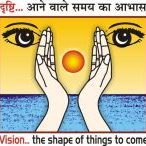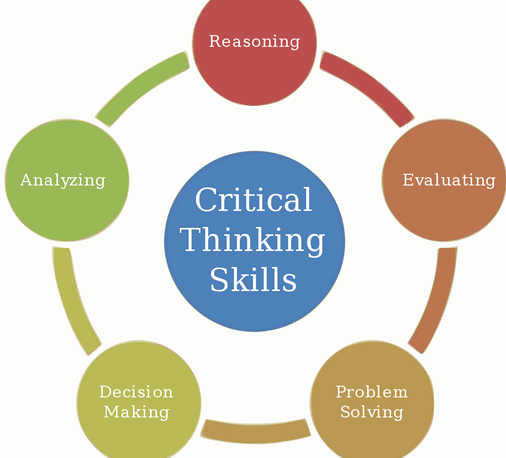A 10 minutes read.
By Innovation & Research Cell, Vision Group of Institutions
The number-one skill that high innovators value most in their talent is critical thinking. In contrast, companies identified as less-innovative placed critical thinking last of eight surveyed skill sets.
Technical skills and expertise of Industry 4.0 disciplines—like data science, cybersecurity, or artificial intelligence—are certainly essential. However, the “human factor” of an individual—the ability to think critically and creatively—is a powerful differentiator.
Deloitte Survey: “The Human Factor”: Navigating Success in Industry 4.0
Critical thinking has been the subject of much debate and thought since the time of early Greek philosophers such as Plato and Socrates, and continues to be a subject of discussion into the modern age. Let us try to understand the finer details of Critical Thinking and also assess ways to grow the same.
What is critical thinking?
Critical thinking might be described as the ability to engage in reflective and independent thinking. Critical thinking requires you to use your ability to reason. It is about being an active learner rather than a passive recipient of information.
Those “uniquely human” skills of judgment and interpretation cut to the heart of critical thinking. The majority of us have heard this phrase for most of our lives, but the concept itself is abstract enough to defy a succinct definition. Critical thinking is a strategy of thought that guides you towards making decisions that aren’t influenced by personal biases or preconceived notions. Essentially, it is the ability to step outside your own point of view to address a problem pragmatically and arrive at the best decision possible.
Becoming a critical thinker
Critical thinking cannot be digitized. It’s also something you cannot learn in just one class. Critical thinking skills are developed via practical and theoretical experience—through new situations that force you to solve complex problems, debate your peers, and engage different perspectives. You become a critical thinker through failure that forces you to reevaluate your approach and experiment with different solutions. Deloitte’s report even defines high innovators, in part, as companies that give their leaders leeway to learn from failure.
In his pathbreaking book “In Search of Deeper Learning”, Jay Mehta and Sarah Fine offer vital lessons for critical thinking. They define Deeper learning as a set of competencies that include content mastery, critical thinking, collaboration, and effective communication. Mehta and Fine define it as the place where “mastery, identity, and creativity” meet. Students who have engaged in deeper learning have strong expertise in a field, learn to identify themselves as practitioners of the discipline, and acquire the ability to create something new, such as original scholarship or art.
People learn well when they are motivated and have a purpose, and when they are parts of communities that have different levels of expertise than they do.
Jay Mehta, In Search of Deeper Learning
Practice makes perfect, but doesn’t make new
Critical thinking calls for looking at things from multiple perspective. Here conformists and innovators directly come head-to-head. One of the vital prerequisites of critical thinking is to challenge established views; perhaps not in form of a revolution, but definitely to ensure that these do not deter us from thinking ahead. You cannot question anything perfect. Maybe the science (or is it the art!) is to accept that nothing is perfect.
The reasonable man adapts himself to the world: the unreasonable one persists in trying to adapt the world to himself. Therefore all progress depends on the unreasonable man.
― George Bernard Shaw, Man and Superman
In his widely acclaimed book Originals: How Non-Conformists Move the World, Adam Grant, author & Professor of organizational psychology at University of Pennsylvania, reflects on addresses the challenge of improving the world, from the perspective of becoming original: choosing to champion novel ideas and values that go against the grain, battle conformity, and remove outdated traditions.
The more you value achievement, the more you come to dread failure . Instead of aiming for unique accomplishments, the intense desire to succeed leads us to strive for guaranteed success. As psychologists Todd Lubart and Robert Sternberg put it, “Once people pass an intermediate level in the need to achieve, there is evidence that they actually become less creative.”
-Adam Grant; Originals: How Non-Conformists Move the World
This though is certainly not a new thing. Philosophers and thinkers have always been advocating the need to tend towards being original, or even dumping old and outdated values and traditions. In holy book Bhagwad Geeta, Lord Krishna stresses on the urgent challenge to let go the old traditions or parampara.
Dr. Judy Chartrand, Author & Consulting Chief Scientist with Pearson, has observed that Critical thinking is the lifeblood of the most essential workplace skills, including problem solving, decision making, good judgment and sound analysis. Organizations that can attract, retain and develop the best critical thinkers have a significant and measurable competitive advantage in the business world. Yet business suffers from a severe shortage of critical thinkers. Too few employees come to their jobs with these skills, and too few have the opportunity to develop them in the workplace. The good news, however, is that critical thinking can be taught, and applied directly to on-the-job problems and decisions.
Good decisions require focusing on the most relevant information, asking the right questions, and separating reliable facts from false assumptions – all elements of critical thinking. And yet too few employees possess these essential skills.
Critical Thinking Means Business: By Judy Chartrand, etc.
There are so many ways to develop your critical thinking skills to position yourself for success in this new age in which we now find ourselves. On-the-job experience certainly helps, as does your education. An advanced degree, in particular, places you in an environment engineered to build these skills: an academic setting, where you are forced to think outside the box, yet given ample room to safely explore.
Further reading material
Models of Critical Thinking
Bloom’s Taxonomy
Bloom’s Taxonomy was created by Benjamin Bloom in 1956, published as a kind of classification of learning outcomes and objectives that have, in the more than half-century since, been used for everything from framing digital tasks and evaluating apps to writing questions and assessments. Bloom’s taxonomy is a set of three hierarchical models used to classify educational learning objectives into levels of complexity and specificity. The three lists cover the learning objectives in cognitive, affective and sensory domains. Read More
The Halpern Critical Thinking Assessment
The test assesses the five dimension of critical thinking: verbal reasoning, argument analysis, thinking as hypothesis testing, likelihood and uncertainty, and decision making and problem solving.
The HCTA is unique because it is the only test of critical thinking that uses multiple response formats, which allow test takers to demonstrate their ability to think about everyday topics using both constructed responses and recognition formats.
Pearson’s RED Critical Thinking Model
Pearson has developed the following RED Model – Recognize Assumptions, Evaluate Arguments, Draw Conclusions – as a way to view and apply critical thinking principles when faced with a decision






Critical thinking has always been a milestone in an individual’s success story.. adapting oneself to the world produces flag bearers .. kudos for promoting such genuine basic principles of life
thanks for your observations!
Critical thinking has always been a milestone in an individual’s success story. The unreasonable ones, who don’t adapt themselves to the world, indeed become flag bearers for others. KUDOS for promoting such genuine basic principles of life
Very nice Article, to get insight to critical thinking concept and why it is needed.
thanks for your observations!
[…] understanding issues of society like Diversity, Equity & Inclusion, Igniting Purpose of Life, Developing Critical Thinking Skills, etc. The aim of these sessions is to cater to holistic development of the students, and to […]
nice article